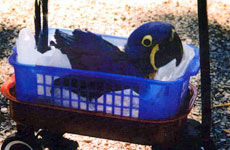Ave Azul de la Osa is a federally licensed Avicultural compound, supporting conservation through captive propagation. Ave Azul’s conservation efforts are in association with Bird jungle of Kauai, a former endangered species breeding facility in Hawaii, USA. Bird Jungle of Kauai’s mission was to increase numbers and enhance the current status of many rare and endangered species of birds through captive breeding programs.
Owner / Director of Ave Azul de la Osa, Patrick S. Dunn was director of Kauai Zoological Gardens and curator of birds for 8 years while managing the parrot park for near 17 years simultaneously. Read Patrick Dunn’s Biography here.
Recently stock from Hawaii was imported to Costa Rica and set up in the south of the country in the Peninsula de Osa on a 250 acre breeding farm in Corcovado National Park reserve. Paperwork for the legal importation of the collection was near 3 years in a process involving half a dozen agencies in both countries. Originally started on the Hawaiian Island of Kauai some 27 years ago, 90% of the stock here now in Costa Rica is from Hawaii.
Ave Azul intends to keep and propagate a minimum of three pairs of a particular species of bird. The offspring derived from the breeding pairs will create nuclei for future generations. Unrelated progeny will be paired for future breeding when appropriate or placed in other responsible avicultural hands for propagation with a final goal of being released back into suitable habitat once it is secured.
Of this year’s hatchings,(2010) the most significant was that of two third generation hyacinth macaws. In the wild, the bird’s status is rare, and at-risk recognizing them as critically endangered. They have been placed on Appendix 1 of the “CITES Treaty”, an international treaty regulating the possession, trade, and movement of endangered species of wild flora and fauna to prevent their over-exploitation. Read more on our new birds here.
Ave Azul de la Osa is also currently running and supervising a Scarlet Macaw nesting project – click here to read more about the project.
We feel the future is now, and we believe we have the responsibility to the birds which are under our care to do the best we can – while we can to guarantee the perpetuation of their species. As aviculturalists we do not have the luxury to wait until all the questions are answered. As the captive wild population’s age, the breeding possibilities diminish, and sooner rather than later all F1 (founder) stock will not be viable. If the genes from these birds have not been renewed through captive breeding efforts, they will be lost forever.
As individuals we know we cannot save everything, but if each of us as responsible aviculturalists devotes a portion of our time to the propagation of just one species we can actually make a difference!
With over 850 species of birds known and some 5% of all known plant and animal species, Costa Rica with its own population of endangered species, namely Scarlet Macaws, has the potential to fulfill a very important role in Aviculture. There are few places in this world with a similar climate especially suited for captive breeding of tropical birds.
Currently, there are some 350+ species of birds recorded in the area. We frequently observe all four species of primates found in Costa Rica, simultaneously along with toucans, spectacular insects, and a myriad of other natural curiosities. Additionally, we have recently opened a natural history museum, displaying a variety of shells, fossils, preserved specimens, a large egg collection, and an extensive insect collection.
Come and see what the future of Aviculture looks like at Ave Azul de la Osa. We are open for tours, talks and photo op’s Tuesday through Sunday 9:00am – 4:00pm. Admission is just $US 20 per person/students $US10, and goes towards the running of the farm. We welcome groups, hobbyists, and researchers anytime.
To make a reservation – please contact us (just click here to get to our online contact form) or email us to:
aveazuldelasosa@hotmail.com
“Why have animals in captivity or zoos? So we can show our children what it is, instead of just what was in a book.”










 Wake each morning to the magical laughter from a gang of Australian Kookaburras and the drum like sounding calls of African crowned Cranes. The greeting of dawn is completed by the roar of Howler monkeys staking their territory high above the tropical trees. These are the sounds of an undisturbed jungle forest habitat and working exotic bird farm “Ave Azul de la Osa”.
Wake each morning to the magical laughter from a gang of Australian Kookaburras and the drum like sounding calls of African crowned Cranes. The greeting of dawn is completed by the roar of Howler monkeys staking their territory high above the tropical trees. These are the sounds of an undisturbed jungle forest habitat and working exotic bird farm “Ave Azul de la Osa”. 








